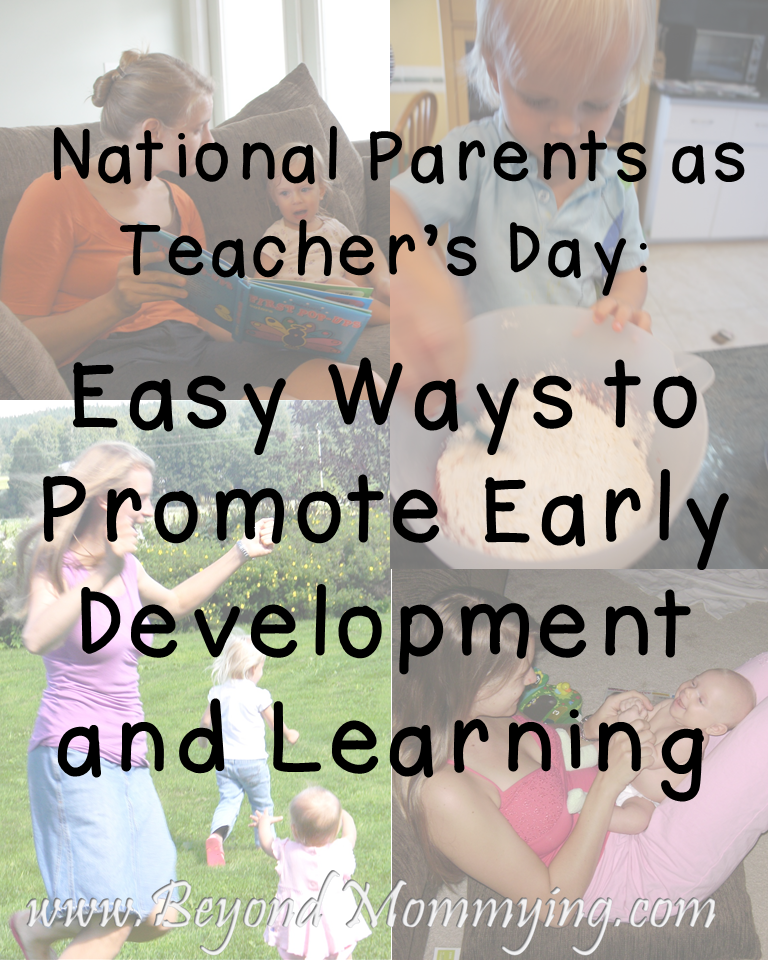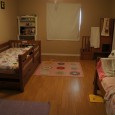On November 8th each year, National Parents as Teachers Day is recognized. The program started in the 1970s as an effort to prepare children in Missouri for Kindergarten by helping parents provide support at home to their children and as an early detection service to help children with delays and health problems receive early intervention services. The National Parents as Teachers organization is now in all 50 states and six other countries.
While I’ve fully embraced the “parent as teacher” lifestyle by undertaking homeschooling my children and have always believed in the power of good parenting, the day is about recognizing ALL parents as their children’s first teachers and the impact parents make on the lives of their young children.
Many people don’t realize or think about how quickly children learn when they are young. From the moment a child is born (and even before), a parent’s words, cuddles, and love are teaching their child about the world. The experiences provided to children by parents whether at home or out and about teach children what they need to know about life in this big crazy world.
A lot of what we do as parents is instinctual and we act completely different when interacting with a baby or child. We talk to babies in a certain way and change our mannerisms when talking to a young child. This all has been proven to be natural because it’s the way babies and children respond, understand and learn the best.
So what does it mean for the parent to be a child’s first teacher? What does a parent have to do to prepare their child for school and the “real” world? Don’t panic or reach for the flashcards! The things children need to learn and grow are simple. They need love, support, kindness and interaction.
So what can a parent do on a daily basis (not just on the national holiday!) to be their child’s teacher and actively participate in their child’s education? Here are a few simple ideas:
- Talk to your child ALL the time. Explain what you’re doing, what s/he is doing, what you see. Draw their attention to new things and describe them using tons of describing words: “Doodle, do you see the tiny, little blue bird in the very tall tree? See, it’s behind the green leaves on the long branch!”
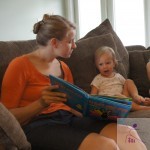 Read to your child. Whatever books you like. Whatever books they like. Read the words, talk about the pictures, point to the words as you read (or don’t), ask your child to find things in the pictures or letters on the page (if they’re able to). Books are amazing tools. Not only are they essential for early literacy development but they are also treasure-troves of vocabulary and information.
Read to your child. Whatever books you like. Whatever books they like. Read the words, talk about the pictures, point to the words as you read (or don’t), ask your child to find things in the pictures or letters on the page (if they’re able to). Books are amazing tools. Not only are they essential for early literacy development but they are also treasure-troves of vocabulary and information.- Play with your child. Build blocks, play trains or cars, make-believe, dress up. Let your child lead where the play goes but be an active participant. Add to their play by adding details or asking questions. “What if we…”
- Ask lots of questions. Don’t always give your child the answers to life, let them figure it out! This is great for early problem solving, teaching independence and also makes them feel like they’re a little bit in control of a situation. Just as you talk about everything you do in the day, ask age-appropriate questions a long the way. Even Doodle is beginning to answer simple questions like “what do you want?” when he’s upset and “are you okay?” when he falls. I also regularly ask him “what do you see?” and describe what he points to.
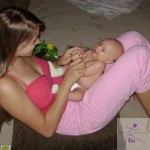 Sing. Songs are often soothing for small babies and engaging for older babies and young children. And it really doesn’t matter what you sing. Sing your favorite pop song, make something up or sing familiar nursery rhymes. The rhythms and tones are what’s important (and don’t worry if you’re a “terrible” singer, if anyone can appreciate your singing voice, it’s your baby!)
Sing. Songs are often soothing for small babies and engaging for older babies and young children. And it really doesn’t matter what you sing. Sing your favorite pop song, make something up or sing familiar nursery rhymes. The rhythms and tones are what’s important (and don’t worry if you’re a “terrible” singer, if anyone can appreciate your singing voice, it’s your baby!)- Get your child involved in daily tasks. Let your child help with whatever you’re doing whether it’s cooking, cleaning, laundry, work, etc. Give them small tasks to complete using clear, simple directions. Direction following is an important life skill and helping out makes a child feel responsible and important to the family structure. Starting when babies are becoming coordinated, have them try to help put their toys in a basket/bin when done and give them more advanced skills and tasks as they grow.
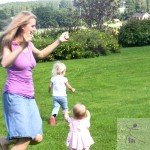 Be silly. Take the time to dance with your child, tickle them, chase them around, play hide-and-seek or peek-a-boo and get crazy. Life should be about having fun and these are the moments you’ll remember as your children grow (and so will they!)
Be silly. Take the time to dance with your child, tickle them, chase them around, play hide-and-seek or peek-a-boo and get crazy. Life should be about having fun and these are the moments you’ll remember as your children grow (and so will they!)
Parents as teachers and being prepared for school is not just about the ABCs and 123s, though those things can (and will) be achieved through the above interactions. Being your child’s first teacher is really about preparing your child socially for the world and whatever classroom you choose for them so they are ready to learn the academic things they need to know.
A child who enters school happy, healthy and loved with always do well in a supportive, caring environment.

